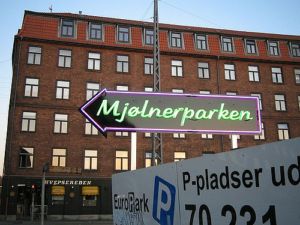News
Mjølnerparken resident lawsuit a step closer to High Court
This article is more than 4 years old.
Ministry of the Interior and Housing accused of ethnic discrimination

Mjølnerparken: not exactly lit up about the ministry’s plans (photo: flickr/Kim Bach)
A group of 11 residents from Mjølnerparken, one of Copenhagen’s most notorious housing estates, want to take the Ministry of the Interior and Housing to court over its spring 2020 decision to permit the sale of 260 apartments, resulting in the forced relocation of all those living in them.
The residents group are suing the ministry for ethnic discrimination – significantly for the legal action, Mjølnerparken has been on the government’s ‘Ghettolisten’ since its introduction in 2010, and inclusion is dependant on half the residents being non-white.
The ministry approved the sale because it wants to reduce the estate’s public housing ratio down to 40 percent by 2030.
Looks destined for court
The ministry has been trying to out-manoeuvre the civil lawsuit, which began at the Eastern High Court on November 3 with the first of several hearings, by arguing the plaintiffs are not directly affected by the ministry’s approval of the overall plan for Mjølnerparken.
Lawyer Eddie Omar Rosenberg Khawaja – whose lawsuit will cite the law on ethnic equal treatment, Denmark’s international obligations in relation to human rights and EU – rejects this claim.
“When the ministry’s decision directly affects a citizen’s opportunity to live in the home that has formed the framework for the citizen’s home and family for many years, then it is my opinion that one is affected both concretely, individually and with such strength that one has the opportunity to bring a case against the authority that made the decision,” she told København Liv.
A strong case
The plaintiffs feel they have a strong case – sentiment echoed across the city’s legal community.
“We want to hold the ministry accountable for violating our rights and forcing us to move out of our homes,” one of the plaintiffs, Majken Felle, explained to København Liv.
“We have chosen to sue the ministry because it is extremely unsafe to face a forced relocation.”










































